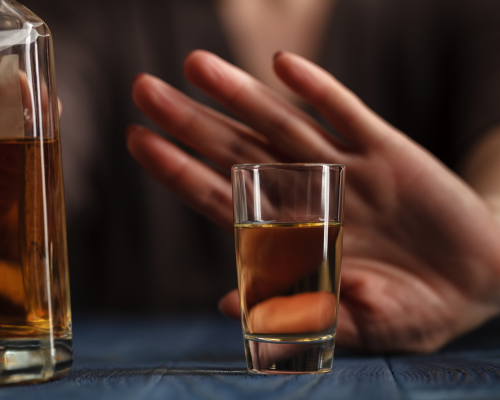
Drinking alcohol can easily become a habit: a cocktail after work, a glass of wine with dinner, and few beers while watching the game can quickly add up over the weeks.
The new year is a convenient time to interrupt and reassess the habit. Dry January is a trending challenge to go all 31 days of the month without a drink. You might be surprised at the positive changes in your body, mind, and mood when you take a break from alcohol.
According to Candace Perry, M.D., a psychiatrist at UAB St. Vincent’s Behavioral Health, the potential benefits of Dry January are numerous. “Spending just one month alcohol-free can improve mood, sleep, and anxiety, as well as reduce blood pressure,” she said. “And for some patients, it can result in excess weight loss.”
Dr. Perry explains how it works:
- Improved sleep: “Alcohol use can contribute to insomnia (trouble falling or staying asleep) and decrease overall sleep quality.”
- Mental benefits: “Alcohol can worsen attention, concentration, and impair overall cognitive function even outside of periods of intoxication. Eliminating alcohol can improve mental clarity.”
- Better liver function: “Alcohol use can worsen many health conditions, including hypertension and diabetes, as well as contribute to the risk of liver and heart disease Alcohol is particularly damaging to the liver long-term because the liver has to work hard to break down such toxic compounds.”
- Better emotional and spiritual health: “Alcohol can worsen mood and contribute to depression and anxiety. It can worsen attention and concentration and impair overall cognitive function — even outside of periods of intoxication.”
Dr. Perry warns that while alcohol seems to reduce stress, the opposite is actually true. “Alcohol acts as a central nervous system depressant, meaning patients may experience relaxation. However, this is a short-lived sensation,” she says “Alcohol consumption can increase the body’s release of the ‘stress hormone’ cortisol. This can lead to both short and long-term health effects.”
Dr. Perry says that Dry January helps patients reconsider their relationship with alcohol, discover the health benefits of abstinence, and identify new ways to manage stress. “It may also help patients recognize if they need to have a more in-depth discussion with their health care provider about their alcohol use. Likewise, this may help providers identify patients with risky drinking that may benefit from medication and therapy to help with alcohol cessation,” she adds.
Position Yourself for Success
Ready to give Dry January a try? To set yourself up for success, Dr. Perry suggests replacing an evening cocktail with a mocktail (a fun drink without alcohol) or substituting drinking with another activity, such as an evening walk or visiting the gym for happy hour.
We’re Here to Help
If you’re a light or moderate drinker (defined as men who drink more than 14 standard servings of alcohol per week or women who drink more than seven standard servings of alcohol per week), trying Dry January on your own can improve your health and well-being. However, individuals who are currently drinking at more than a moderate level or who experience increased anxiety, shakiness, or other physical symptoms when not drinking daily should discuss a plan with your health care provider.
“For patients who are drinking at higher than moderate rates or who have problems cutting back on their own, there are treatments including therapy and medications to help with stopping alcohol use,” Dr. Perry says.
If you try Dry January and find it overwhelming, or if you would like help to stop drinking, call 205-838-3349 to speak to UAB St. Vincent’s Behavioral Health, or visit the UAB St. Vincent’s Substance Use and Addiction Disorders website.

